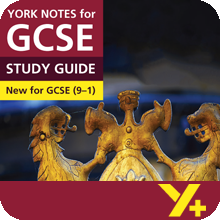Your Assessment
Read through the answer below and decide what grade to give it. Use the Hints & Tips to help you make your assessment.
Question: Read from Act I Scene 3 ‘Marry, that “marry” is the very theme/I came to talk of’ (line 44) to ‘Go, girl, seek happy nights to happy days’ (line 85). At this point in the play, Lady Capulet talks with her daughter about the prospect of marriage.
Starting with this conversation, explore how Shakespeare presents parents and children.
Write about:
- how Shakespeare presents Lady Capulet and Juliet’s relationship in this conversation
- how Shakespeare presents parents and children in the play as a whole.
Lady Capulet does not seem like a very good mother to Juliet in this extract. She is quite frosty and blunt with Juliet and seems to be in a rush to talk to her, ‘Tell me, daughter Juliet, /How stands your disposition to be married?’
She comes to Juliet’s room to talk about getting married. Basically she wants Juliet to marry Paris and so visits Juliet when she is with her Nurse. The Nurse keeps chipping in, ‘A man, young lady! Lady, such a man . . .’ which makes Lady Capulet seem more impatient as what she has to talk about is serious.
Juliet is really young to be thinking about marriage, but we find out that Lady Capulet married Capulet at much the same age, as at this time, it was very common for girls to marry and have children when they were very young themselves. This tells us that Juliet’s parents have a very big age difference between them and this could explain why Capulet is so much in charge of the household.
Lady Capulet gives a long speech where she is persuasive and tries to show Paris in a good light, ‘find delight writ there with beauty’s pen.’ She is giving advice to her daughter about how she should marry Paris, but it seems she is judging Paris on his looks and his money, not on Juliet’s feelings, which should also be important for a parent. She says ‘So shall you share all that he doth possess’.
It seems strange to us that this is what a parent would want for a young girl, but really Lady Capulet is only trying to make sure her daughter has a secure future.
Lord Capulet seems more concerned about Juliet at first and comes across as caring and protective when Paris comes to ask him for her hand in marriage. Lady Montague also seems like a caring parent when she is so worried about Romeo, she asks his friend Benvolio to keep an eye on him for her. We later learn she has died of grief when he is banished, so it looks like she loved her son very much.
However, neither Romeo nor Juliet can have that good a relationship with their parents as they don’t feel they can tell their parents they have fallen in love. They do everything behind their back and get married in secret, which leads to disaster.
Capulet also changes his moods and feelings towards his daughter when he thinks she is not going to do as she is told. His language becomes very aggressive, and he is insulting towards Juliet and also threatening. He tells her ‘Hang thee, young baggage, disobedient wretch! I’ll tell thee what: get thee to church a’Thursday. Or never after look me in the face. My fingers itch.’ This shows us he is more worried about his own pride and reputation than about what his daughter really wants. ‘Hang, beg, starve, die in the streets’.
However, at the end of the play both the Montagues and the Capulets seem absolutely devastated that their children are really dead. However, if they had thought more about what their own children might have wanted and what might have made them happy instead of allowing the feud to carry on, they might not have had to lose their only children.
